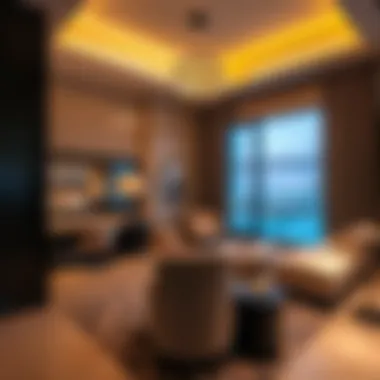A Comprehensive Guide to Dubai's Hotel Scene


Intro
Dubai’s hotel scene is like a colorful tapestry where high-end luxury meets practical affordability. With an endless stream of visitors flocking here for work and play, the diversity in accommodation options reflects both the city’s rich heritage and its ambitious future. This region has emerged as a beacon for hospitality enthusiasts and real estate investors alike. Each hotel not only provides a place to stay, but also an experience steeped in the local culture and global trends.
Recent years have seen remarkable transformations in Dubai’s hotel industry. From sky-high luxury resorts to charming boutique hotels, every establishment seems to tell a unique story. As we unfold the layers of this intricate landscape, it becomes clear that understanding the trends and nuances can be immensely beneficial.
Whether you’re a traveler in search of the perfect sanctuary or an investor scouting for lucrative opportunities, this article aims to offer a thorough exploration of the hotel landscape in Dubai. Together, we will analyze the current market insights, dive into promising investment strategies, and ultimately equip you with the knowledge needed to navigate this dynamic sector.
The Evolution of Hotels in Dubai
The development of the hotel industry in Dubai serves as a mirror reflecting the emirate's astonishing transformation from a modest trading hub into a world-renowned luxury destination. This evolution is critical not only for tourists seeking upscale accommodations but also for investors keen on understanding market trends. The interplay of culture, architecture, and economic foresight has shaped the landscape of hospitality in this dynamic city, illustrating how necessity and ambition can fuel growth.
Historical Overview
From its humble beginnings, the hotel scene in Dubai has undergone significant shifts. In the 1960s, when the UAE was still establishing its identity, the tools for hospitality were basic. Travelers often found solace in small guesthouses and hostels. With the discovery of oil in the late 1960s, wealth began to pour into the region, prompting an investment in infrastructure and tourism. By the 1970s, notable chains like Hilton opened their doors. This marked the birth of Dubai as a force in the hotel industry, where an emerging clientele was introduced to standards that were once unseen in the region.
As the years turned into decades, the influx of international tourists began in earnest. By the 1990s, Dubai was already bustling with entertainment options, shopping malls, and world-class restaurants—laying the groundwork for a wider variety of accommodations. Developers took notice, and the landscape of Dubai grew dominated by lavish hotels. The Burj Al Arab opened in 1999, famously claiming the title of the only 7-star hotel in the world, setting an outrageous benchmark for luxury that lured in tourists and put Dubai firmly on the global stage.
Modern Developments
In the early 2000s, Dubai's ambitions soared. The government strategized to turn the city into a tourist mecca, and hotels were pivotal in this mission. Innovations in design and technology became the name of the game, and a new breed of hotels emerged. Established brands expanded their footprints in Dubai, while new local players brought fresh concepts to the table, marrying rich Arab heritage with modern aesthetics.
As recent as 2020, although challenged by the global pandemic, the hospitality sector in Dubai showed resilience. Hotels embraced digital transformations—check-ins became contactless, and mobile apps provided guests with services at their fingertips. This blend of modern comforts and high-end luxury attracted not just tourists, but corporations eyeing Dubai for conferences and corporate retreats.
The Expo 2020, albeit moving to 2021 due to global circumstances, presented a golden opportunity for hotels to showcase their unique offerings. The city braced itself for an influx of visitors, leading to further enhancements in hotel amenities, making the landscape even more versatile.
As global traveler preferences evolve, the demand for varied accommodations creates an energetic market for investors and developers alike.
Ultimately, the evolution of hotels in Dubai mirrors broader socio-economic changes within the region. With each phase of development, accommodations have adapted to meet the needs of an increasingly discerning clientele, positioning Dubai as an ever-frequented stop on the global tourism map. As we look ahead, one can only ponder what the coming decades might hold for this fascinating sector—will new trends in sustainability or technology define the next chapter in this hospitality saga?
Types of Accommodation
When exploring the vibrancy of Dubai’s hotel sector, understanding the types of accommodation available is fundamental. This section breaks down the diverse options that cater to various tastes and budgets, ensuring both comfort and economy for travelers. Each type brings its own set of advantages, offering unique benefits for a range of visitors—whether they're high-flying businesspersons or family vacationers. In a city known for opulence, finding the right stay can mean the difference between an extraordinary experience and a missed opportunity.
Luxury Hotels
Luxury hotels in Dubai are synonymous with excessive comfort and high-end amenities. From lavish suites with sprawling views to world-class dining options, these establishments redefine hospitality. The depiction of luxury can vary, but it often includes personalized service and stunning architecture.
The Seven-Star Experience
The concept of the seven-star experience is not just a marketing gimmick in Dubai; it is an epitome of extravagance that some hotels strive to achieve. These establishments, like the Burj Al Arab, elevate the very notion of hospitality through their ultra-luxurious offerings.
One key characteristic of seven-star hotels is their emphasis on bespoke service. Guests can expect butlers trained to anticipate every need, dining presents like no other, and facilities akin to private residences. The Burj Al Arab features helicopter transfers, private beaches, and unlimited access to exclusive amenities, making it a highly sought-after choice for those looking to splurge.
However, the exclusivity comes with a price that can deter budget-conscious travelers. The extraordinary service and facilities justify the cost, making it a thrilling experience for discerning patrons, but it may remain out of reach for many.
Iconic Structures
Iconic structures are another hallmark of Dubai's luxury hotel landscape. The skyline is punctuated with hotels that aren't just accommodations but landmarks in their own right. Structures like the Atlantis, The Palm and the JW Marriott Marquis combine architectural marvel with lavish services.
These hotels demonstrate what it means to blend location, luxury, and lifestyle. The Atlantis, The Palm, situated on a man-made island, boasts an underwater aquarium and a water park, offering unique attractions beyond the usual hotel experience. This appeal makes it a popular choice among tourists, especially families.
Notably, the larger-than-life scale of these hotels often means that they can host events, conferences, or even weddings, providing a versatile space for different gatherings, although the bustling environment might not suit those seeking tranquility.
Mid-Range Hotels
Catering to travelers seeking balance between price and comforts, mid-range hotels have become key players in Dubai's accommodation scene. They serve as a bridge, providing quality experiences without the exorbitant prices of luxury hotels.
Comfort Meets Affordability
The comfort meets affordability concept is pivotal for those who want a pleasant stay without breaking the bank. Many mid-range hotels feature decent-sized rooms, often equipped with essential amenities like free Wi-Fi and breakfast options. Establishments like the Holiday Inn Dubai Festival City epitomize this category, providing easy access to some of Dubai's top attractions.
The unique feature here is the value for money; guests can enjoy a cozy atmosphere without luxurious frills. However, while the affordability is attractive, some might argue the facilities may lack the polish found in higher-end venues, such as fewer dining options or less personalized service.


Key Locations
Key locations for mid-range hotels often influence the choice of many visitors. Hotels situated near business hubs, shopping centers, or near cultural landmarks tend to attract visitors who prioritize convenience.
For example, a hotel like Rove Downtown, located right next to the Burj Khalifa, allows guests to explore easily while being offered a vibrant atmosphere. This aspect appeals significantly to young travelers and urban explorers looking to absorb the city vibe. The drawback, however, may arise from the lively surroundings, which can sometimes lead to noise disturbances during the night.
Budget Accommodations
Budget accommodations in Dubai provide options for travelers who are keen to explore the city without plowing through their savings. These options include hostels, basic hotels, and serviced apartments, ensuring that everyone can experience what Dubai has to offer.
Value for Money
Value for money is the guiding principle for budget travelers seeking reliable stays in the city. Establishments often offer no-frills rooms at affordable prices. Hotels like the Citymax Hotel Al Barsha provide comfortable lodging with essential services, making them popular among budget-conscious tourists and backpackers alike.
The distinctive feature of these hotels is the basic comfort they provide at competitive rates. However, the trade-off is often a lack of extensive amenities, and one may find limited dining options or smaller rooms that might not provide the luxury of more expensive venues.
Economical Choices
The economical choices available cater specifically to those who prioritize cost without sacrificing basic comforts. Simple but effective, budget establishments can offer a home-like feel in a foreign city. For instance, Ibis Styles Dubai Jumeirah provides clean, contemporary rooms at rates that appeal to various demographics—traveling students, young professionals, or families looking to save while enjoying a trip.
Despite their appeal, it’s worth mentioning that these places might require a few sacrifices on the luxury front, so those expecting lavish services might find them lacking in certain areas.
Notable Hotel Chains
The dynamic hospitality landscape in Dubai is influenced majorly by various notable hotel chains, which not only provide a sense of familiarity for travelers but also contribute uniquely to the city’s identity. When talking about hotel accommodation in such a thriving tourist spot, it is worth understanding the specific elements these chains bring to the table.
International Brands
International hotel brands resonate with travelers around the world as they provide consistency in quality, service, and amenity offerings. Names like Marriott, Hilton, and Hyatt have established themselves as household names. These chains often come equipped with perks like loyalty programs, which can be attractive for frequent travelers.
- Why Choose International Brands?
- Reliability: Consistent service and quality.
- Global Recognition: Familiarity can lead to trusting experiences.
- Extensive Amenities: Innovative wellness centers, top-notch restaurants, and state-of-the-art conference facilities.
Key international hotel chains often serve as benchmark models in the industry, establishing standards that others strive to meet. The operational scale allows them to roll out unique promotions or seasonal offers, enhancing the overall experience for visitors. Moreover, their ability to adapt to different cultures and tastes while maintaining a core brand identity is nothing short of remarkable.
Local Gems
On the flip side, Dubai is also home to a selection of local hotels that offer something distinct. These local gems are often characterized by their unique charm, personalized service, and cultural insights.
Local hotels like Rove Hotels and Al Seef Hotel give visitors a taste of authentic Emirati hospitality. Here, guests often enjoy the luxury of intimate service coupled with local cuisine, enhancing their cultural experience.
- Why Consider Local Gems?
- Cultural Immersion: Provides a deeper understanding of local traditions.
- Unique Offerings: Often cater to specific interests, such as wellness or local cuisine.
- Affordability: Generally, these establishments can offer competitive pricing compared to larger chains.
These properties tend to promote a sense of community and local involvement, often engaging with nearby businesses and cultural sites. Additionally, they can provide travelers with stories and experiences that are distinct from the cookie-cutter offerings of larger chains.
Market Trends
Understanding market trends in Dubai’s hotel sector is essential for anyone looking to navigate this fast-paced landscape, be it as a traveler or a potential investor. The hospitality industry here is not just a reflection of local demands; it interacts dynamically with global economic factors, tourism patterns, and technological advancements.
The unique blend of luxury and affordability characterizes the Dubai hotel scene, making it vital to stay abreast of these trends. Occupancy rates, for instance, reveal underlying economic health, while investment opportunities highlight where growth is headed. Keeping an eye on these elements can provide invaluable insights for savvy investors and homebuyers alike.
Occupancy Rates
Annual Trends
Annual trends in occupancy rates provide an insightful look into the overall performance of hotels in Dubai. Over recent years, there’s been a noticeable uptick in these rates, driven by the city’s strategic marketing and the allure of mega-events, such as Expo 2020. One key characteristic of these trends is their potential to signal the health of the tourism market.
In particular, pre-pandemic data showcased peak occupancy rates often surpassing 80% during peak seasons. This trend is beneficial for investors, as consistent high occupancy isn't just good for business; it also reflects a thriving tourist market that encourages new hotel developments. One unique aspect of annual trends is their cyclic nature; they tend to rise dramatically during certain months, aligning with holidays or the peak tourist season, although they can dip during off-peak times. This can be disadvantageous for stakeholders who rely on steady income year-round but advantageous for those with strategic planning and seasonal adaptability.
Seasonal Variations
Seasonal variations in occupancy rates provide a nuanced understanding of how demand fluctuates throughout the year. They illustrate a clear picture of peak seasons—primarily winter months when tourists flock to Dubai to escape colder climates. Highlights in this characteristic include spikes during major events such as the Dubai Shopping Festival, which typically boosts hotel occupancy significantly.


For travelers and investors, recognizing these patterns can be quite beneficial. On one hand, it allows visitors to plan their trips during optimal periods. On the flip side, hotels may face challenges managing staffing and resource allocation during high seasons. Additionally, the slow summer months can pose a risk for some hotels, leading to heavy discounting just to fill rooms. Adapting to seasonal variations requires not just flexibility but innovative marketing strategies to attract visitors year-round.
Investment Opportunities
As Dubai continues to flourish as a hospitality hotspot, investment opportunities in this sector are abundant. The government’s push for tourism diversification—through campaigns to attract different demographics, such as adventure seekers or cultural enthusiasts—creates fertile ground for new ventures. Moreover, the emergence of niche hotels focused on unique themes or experiences is becoming increasingly popular.
Investors are particularly drawn to projects that align with sustainability practices; the modern traveler is more aware of their environmental footprint and increasingly prefers accommodations that prioritize eco-friendly initiatives. Opportunities are vast, whether it's investing in luxury resorts, boutique hotels, or budget-friendly alternatives that cater to a more diverse clientele. This thriving environment makes it clear that there is a bright future for those eyeing the hotel sector in Dubai.
Key Features of Dubai Hotels
Dubai's hotel scene is not just about providing places to stay; it's a blend of luxury, comfort, and a reflection of the emirate’s unique culture. The features of Dubai hotels often determine their appeal and set the standard in the hospitality sector. With tourists and business travelers flocking to this vibrant city, the key characteristics of hotels can significantly shape visitor experience and attract investment opportunities.
Amenities and Services
Amenities and services play a pivotal role in defining what guests can expect when they choose a hotel in Dubai.
Dining Options
Dining options in Dubai hotels are a feast for the senses. With a bustling culinary scene, many hotels offer a vast array of choices from high-end restaurants specializing in international cuisines to casual dining spots that provide local dishes.
What stands out is the availability of restaurants run by renowned chefs, as well as beautiful views that complement meals, such as rooftop settings overlooking the Burj Khalifa or beachside dining at Jumeirah Beach.
The unique feature of these dining options is that they cater not just to taste but also to experience. Many hotels host themed nights, wine tastings, and cooking classes, allowing guests to engage with the culture.
However, this variety can be a double-edged sword. While it appeals to tourists, high prices in upscale establishments can deter budget-conscious travelers. For investors, understanding the dynamics of these dining options is crucial for making sense of potential profitability.
Wellness Facilities
Wellness facilities have become increasingly important to travelers; most hotels provide an array of services from gyms to full-service spas. Visitors today often seek wellness not just for relaxation, but as part of a holistic travel experience.
Key characteristics include state-of-the-art fitness centers and spas offering everything from traditional massages to advanced therapeutic treatments. Many facilities incorporate local cultural elements, using ingredients like rose water and saffron in their wellness treatments.
A unique feature is the growing trend of wellness retreats offered by some hotels. These programs not only focus on fitness but also offer mental wellness workshops, reflecting a growing awareness of overall health during travel. Yet, the challenge here lies with the space and resources required to create a truly comprehensive wellness center, which can involve significant investment.
Sustainability Practices
As awareness of global issues rises, more Dubai hotels are prioritizing sustainability practices which appeal to the eco-conscious traveler.
Green Initiatives
Green initiatives are at the forefront of many hotel operations in Dubai. Hotels are increasingly adopting sustainable technologies, such as solar panels and energy-saving systems. The benefits of these initiatives extend beyond environmental impact; they often result in reduced long-term operating costs and can attract guests whose values align with sustainability.
A unique feature of these initiatives is the partnership with local organizations to support environmental efforts. For example, some hotels engage in tree planting schemes, which serve as both a marketing tool and a genuine commitment to the community. Thus, the efficiency seen in these green initiatives not only enhances reputation but also provides a compelling narrative for potential investors.
Energy Efficiency
Energy efficiency measures are becoming a standard for hotels in Dubai. This includes everything from LED lighting and smart thermostats to water conservation systems. The appeal of energy efficiency lies in its dual contribution to lowering operational costs and decreasing the hotel’s carbon footprint.
Hotels that implement these measures often see immediate benefits in savings. Moreover, such hotels are likely to gain a competitive edge by advertising their energy-efficient practices to attract discerning guests who prioritize sustainability.
Thus, the continuous focus on enhancing amenities, wellness, and sustainability not only attracts guests but can also shape the future of investment opportunities in Dubai's flourishing hospitality industry.
"As Dubai evolves, so too does the expectation of its hotel offerings; making investment and innovation key to survival in this ever-changing landscape."
For more information on hospitality trends and innovations, visit Britannica and Wikipedia.
Tourism and Hotel Industry Interaction
The interconnection between tourism and the hotel industry in Dubai is critical for understanding the region's economic landscape. As a prime tourist destination, Dubai attracts millions of visitors annually, and hotels play a vital role in facilitating this influx. Not only are hotels places for guests to rest, but they also serve as hubs for cultural exchange and economic activity. They engage local economies by employing thousands and supporting countless other businesses, from restaurants to transportation services.
An increasingly significant aspect of this interaction is how special events can boost tourism and, in turn, hotel occupancy rates. Festivals, exhibitions, and sporting events can lead to a surge in visitors, creating a snowball effect that enhances the city’s reputation as a global destination. Inflated occupancy during these times indicates the need for hotels to adapt quickly—whether through promotional offers or tailored services to meet the unique demands of event-goers.
Furthermore, hotels are often at the forefront of the tourism experience. They curate package deals that promote local attractions, showcasing the city’s rich cultural heritage and modern marvels. Thus, a well-established hotel sector not only facilitates tourism but enriches the overall visitor experience.
"Dubai’s hotels act as gateways to explore the city. Guests often rely on hotel recommendations for their adventures, making hotels pivotal in shaping impressions of Dubai."


Ultimately, the synergy between tourism and the hotel industry is not a mere coincidence. It is a strategic relationship that drives economic growth, making it essential for stakeholders, including investors and hotel operators, to understand the trends and dynamics at play.
Impact of Special Events
Dubai's calendar is filled with an array of special events, from the Dubai Shopping Festival to the World Expo, each bringing its unique flavor and visitor demographic. These events serve not only to amplify tourism but also encourage hotels to innovate their service offerings. For instance, during the Dubai Food Festival, hotels may collaborate with renowned chefs to host exclusive culinary experiences, enticing food enthusiasts to book stays.
Event-related promotions, like reduced rates or complimentary tickets, are common tactics employed by hotel chains. Such strategic moves not only increase occupancy rates but establish the hotel as a pivotal aspect of the event experience. For guests, this added value can make all the difference in their decision-making process.
Additionally, the marketing strategies employed during these periods are critical. Hotels often leverage social media platforms to reach audiences that are particularly engaged in event narratives, ensuring visibility and attractiveness. The economic boost these events provide also translates into long-term benefits, as many visitors will return to Dubai, having built a connection through their initial experience.
Cultural Factors
Culture is the backbone of any travel experience, and Dubai is rich in it. Hotels in Dubai mirror this cultural vibrancy, offering more than just a place to stay—they provide experiences that embody the local spirit. From Arabic hospitality training for staff to in-house cultural events, hotels play a huge role in introducing guests to the emirate’s traditions.
The integration of local culture into hotel operations has significant implications for attracting international tourists. Guests are increasingly looking for authentic experiences. Hotels that cater to this demand by offering local cuisine, traditional entertainment, or excursions that include cultural landmarks often see higher guest satisfaction and loyalty.
Moreover, businesses that understand cultural nuances foster better guest experiences. For investors and real estate professionals, this highlights the strategic importance of catering to cultural elements within the hospitality sector.
Thus, the interaction between tourism and the hotel industry in Dubai reveals layers of complexity where not just business is conducted, but cultural narratives are shared and experienced, leading to an enriched understanding of the city itself.
Challenges in the Hospitality Sector
Navigating the complexities of the hospitality sector in Dubai presents its fair share of hurdles. Understanding the challenges is crucial for anyone involved in the business, ranging from investors and hotel managers to analysts focused on market trends. This region’s dynamic characteristics, influenced by a mix of economic and regulatory factors, require careful consideration and strategic response planning.
Economic Fluctuations
Economic fluctuations play a significant role in shaping the hotel landscape in Dubai. When the economy takes a downturn, discretionary spending typically decreases, which can lead to reduced occupancy rates in hotels. In a place like Dubai, which thrives on tourism, a reliance on leisure travel means that an economic slump can hit hard.
- Visitor Numbers: A drop in incoming visitors, whether due to economic concerns or global events, directly affects hotel bookings.
- Pricing Strategies: Hoteliers may feel compelled to lower their prices to attract guests during tough times, which can impact profit margins.
- Strategic Adaptations: Many establishments have had to rethink their business models to weather these storms effectively. For instance, marketing to local residents or offering special packages can help keep occupancy levels from plummeting.
The COVID-19 pandemic is a prime example of how sudden economic changes can impact the hotel industry. The resulting decline in global travel saw many hotels close their doors or shift to alternative accommodation models like short-term rentals to stay afloat. As the market recovers, lessons learned during these times will be invaluable in crafting resilient strategies for the future.
Regulatory Changes
Regulatory changes can create a maze for hoteliers, often altering the playing field significantly. Dubai's hospitality industry has seen regulations evolve rapidly to accommodate growth and international standards. Understanding these nuances is essential for anyone invested in the market.
- Compliance Requirements: From health and safety standards to labor laws, compliance can be a double-edged sword. While regulations aim to ensure quality, they can also impose additional costs on hotel operations.
- Licensing Processes: Acquiring necessary permits and licenses can be time-consuming and complex, particularly for new players entering the market.
- Evolving Standards: Changes in tourism regulations, especially those tied to environmental sustainability, have encouraged some hotels to implement greener practices, though these changes often require upfront investment.
Moreover, recent shifts in laws regarding foreign investment and property ownership present both opportunities and responsibilities. As the government of Dubai continues to refine its approach, keeping abreast of these changes is key for anyone wishing to succeed.
"Adapting to economic fluctuations and regulatory changes is not just about survival; it's about positioning for the future."
In summary, the challenges in the Dubai hospitality sector are multilayered and ever-evolving. For investors, understanding these elements can lead to better decision-making and more effective strategies—all while ensuring compliance and sustainability in an increasingly competitive landscape.
For further reading, check out resources such as Dubai Tourism and United Nations World Tourism Organization.
Future Outlook
The future of the hotel sector in Dubai is an enticing narrative. As the Emirate continues to ascend as a global travel hotspot, various components play crucial roles in shaping what's next for local hospitality. Investors, prospective homebuyers, and realtors need to keep a keen eye on these elements to make informed decisions. Understanding the future outlook can also help identify the shifting dynamics that will influence hotel development and potential returns on investment instead of merely focusing on current metrics.
Several factors will influence this trajectory: technological advancements, evolving leisure trends, and sustainability. With continuous investment in infrastructure, the emirate is set to reap the benefits of future advancements that redefine guest experiences and operational efficiencies.
Furthermore, as Dubai gears toward becoming a leader in sustainable tourism, hotels that align with these green initiatives are more likely to thrive. This coalescence of factors not only showcases opportunities but emphasizes a shift in focus for traditional hospitality norms.
"Identifying emerging trends before they become mainstream can significantly bolster investor confidence and operational readiness in this evolving landscape."
Emerging Trends
In a rapidly changing environment, staying ahead of the curve is vital for success. Several emerging trends are reshaping how hotels operate and appeal to visitors.
- Tech Integration: Smart hotel rooms equipped with voice-activated systems and mobile app controls are gaining traction. This tech-savvy approach allows guests to customize their stay at their fingertips, enhancing comfort and convenience.
- Wellness Tourism: The demand for wellness-centric facilities has surged. Hotels are increasingly offering health-oriented amenities, such as yoga studios, nutrition-focused restaurants, and personalized spa treatments, inviting guests for a holistic experience.
- Local Experiences: Tourists now prefer immersive experiences that connect them with local culture. Hotels that collaborate with local artisans and tour operators can provide unique experiences that set them apart, appealing to a more discerning clientele.
- Sustainability as a Selling Point: Environmentally-conscious brands are gaining ground. Guests are more frequently opting for establishments that prioritize eco-friendly practices from energy-efficient lighting to zero-waste kitchens.
These trends indicate a significant shift in consumer preferences that hotels in Dubai must adapt to remain competitive.
Long-Term Predictions
As Dubai's hospitality landscape continues to evolve, several long-term predictions can be made. One certainty is the sustained growth trajectory the industry is on, fueled by ongoing tourism campaigns and global events.
- Expanding Market Diversification: The type of traveler is widening. While luxury tourism will always hold its allure, there will be a robust segment of mid-range and budget travelers as the UAE positions itself for increased accessibility.
- Increased Competition: The competition among existing hotels will sharpen as new entrants subscribe to the new trends. Investment in branding and enhanced services will emerge as differentiators, prompting all players to elevate their game.
- Reallocation of Resources: Long-term players might look toward reallocating their resources toward sustainability initiatives and technology upgrades, which could affect their ROI calculations. Balancing these investments while remaining profitable will be a common theme in the years ahead.
- Impacts from Global Affairs: Geopolitical situations, economic conditions, and health crises like pandemics can reshape tourist influx and spending behavior, constantly challenging the hospitality sector to adapt.
These considerations will shape future strategies and opportunities in Dubai's hotel market, allowing stakeholders to fine-tune their approaches in an ever-changing landscape.















